| Wicking Dementia Research and Education Centre - December 2022 Newsletter |
View in browser | Print |
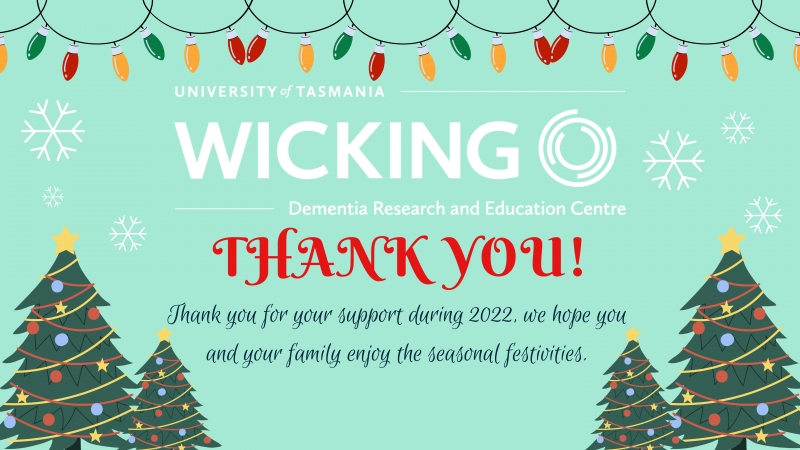 | 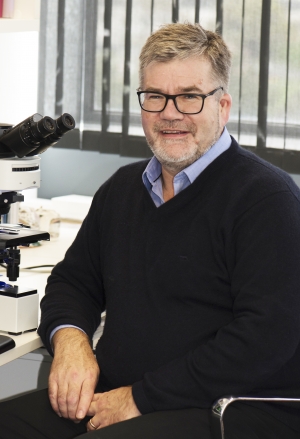
Season's Greetings and best wishes for the New Year!
Thank you for your continued support in 2022, I hope that you have enjoyed our newsletters throughout the year, and I look forward to continuing sharing updates from the Wicking Dementia Centre in 2023. This year there have been many highlights, some of these were: - Continued recognition of our online short courses (MOOCS) as world-leading by Class Central.
- Successful progression of our students in undergraduate and postgraduate courses despite the challenges of the pandemic. It was great to meet graduates at our in-person graduation ceremonies this year.
- Very strong response to our appeal for donations, which will enable support for many of our programs.
- Positive outcomes from our major programs, such as the Island Study Linking Ageing and Neurodegenerative Disease (ISLAND).
- Development of a new program to support the aged care workforce through the Equip Aged Care Learning Packages.
The success of the Wicking Dementia Centre's work in research and education would not be possible without the excellent contributions of staff and research students based at the Centre. Our Christmas wish is that we continue to be successful in delivering programs that raise awareness of the impact that dementia has on the lives of people with dementia and those that care for them. We appreciate your support and would be grateful if you may consider a donation to the Wicking Dementia Centre to help us continue in our mission.
|  | | NEW RESEARCH FUNDING | 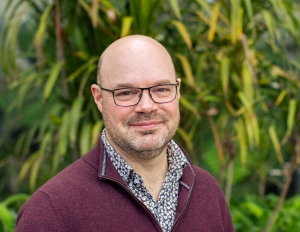
New MND Research at Wicking Dementia Research and Education Centre
New research into how interactions between an individual’s genetics and the environment in which they live contribute to motor neurone disease (MND) will be led by a team of Tasmanian researchers. Associate Professor Tony Cook, from the University of Tasmania’s Wicking Dementia Research and Education Centre, received $999, 981 from FightMND’s latest funding round.
“Understanding how genetic factors interact with environmental exposures is critical to advancing knowledge about the causes of amyotrophic lateral sclerosis (ALS), a form of MND,” Associate Professor Cook said. The team will use human adult stem cells to make motor neurons that contain gene variants linked with MND and expose them to a variety of environmental risk factors for the disease including pesticides, cholesterol and cyanotoxins such as those found in blue-green algae. Investigators will look for key changes and deterioration in the structure, activity, and health of motor neurons containing the ALS-associated gene variants as they engage with ‘risk environments.' “ALS can develop due to interactions between an individual’s genetics and the environment in which they live, where the culmination of lifestyle and genetic factors increases the person’s risk of developing ALS,” Associate Professor Cook said. “The work will help us understand how ALS develops and why cells are vulnerable to genetic and environmental interactions.”
MND is a progressive, terminal neurological disease. Two people are diagnosed with the disease every day in Australia, and there is no truly effective treatment and no known cure.
| | VALE - DR MAREE FARROW | 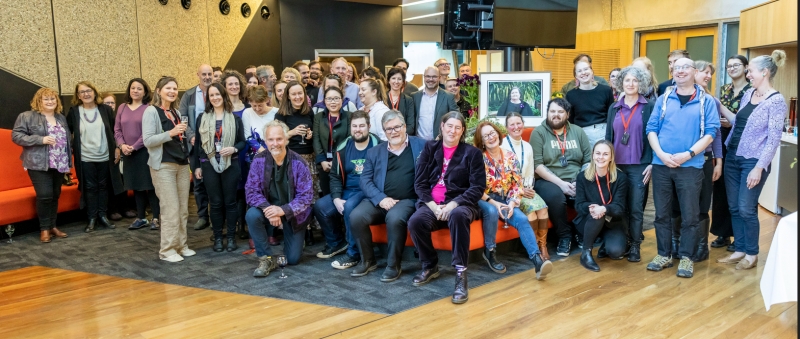 | |
In September this year, the staff at Wicking Dementia Centre came together to celebrate the life of Dr Maree Farrow who was an integral staff member to the work at the Centre and a great friend and colleague to many. We were joined by Maree's family, and we all gathered together to share memories and celebrate her life and the impact that she had here at the Centre, and on dementia research more broadly. During Maree's career her contributions were substantial across teaching and research, as well as with engagement out to the communities that we connect with. Only a few days prior to her passing, Maree was assisting with a grant application that would bring her work on the Preventing Dementia MOOC and the Dementia Risk Profile tool to a wider Australian audience. Maree had such rare expertise on the public health aspect of dementia. She will be missed by all who knew and worked with her at the Wicking Dementia Centre.
| | NEW AGED CARE TRAINING...AND ITS FREE! | 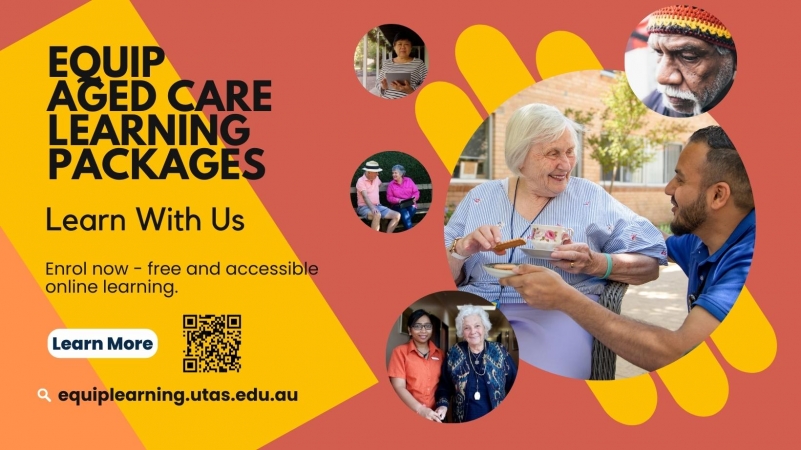 |
The Equip Aged Care Learning Packages are comprised of fourteen modules that have been developed by the Wicking Dementia Research and Education Centre, with funding from the Australian Government Department of Health and Aged Care. Each module only takes 10-minutes to complete and is ideal for anyone interested in the aged care sector, including personal care workers, nurses, allied health professionals, volunteers and families. You can learn at your own pace, anytime and anywhere. The first 6 modules are ready for you. - The Australian Aged Care System
- Exploring the role of Nurses, Personal Care Workers and Allied Health Professionals working in Aged Care
- The Aged Care Quality Standards
- Supporting People Living with Dementia
- Palliative and End-of-Life Care
- Person-centred Care
The Equip Aged Care Learning Introductory Package will offer new starters in the aged care workforce, and those seeking employment in the sector, the opportunity to gain essential knowledge about aged care. Aged care providers are invited to share these resources across their organisation to provide learning opportunities for all staff – both new and existing. |
LEARN MORE
| | BATTEN DISEASE SUPPORT AND RESEARCH ASSOCIATION AUSTRALIA |  | |
From a researcher-funding body relationship to a research and advocacy collaboration, the Wicking Dementia Centre’s Associate Professor Tony Cook and Dr Ineka Whiteman, Head of Research and Medical Affairs at Batten Disease Support and Research Association (BDSRA) Australia are working together to improve the lives of children living with Batten disease. Batten disease, also known as Neuronal Ceroid Lipofuscinosis (NCL), is a family of rare, fatal genetic conditions affecting more than 50 children and young people in Australia. Symptoms are diverse and progressive and include onset of dementia in childhood or adolescence. In what began as a traditional researcher-advocacy partnership, Tony applied for a research grant through BDSRA Australia’s competitive research grant program and has been awarded over $100,000 for work investigating stem cell models of CLN3 disease. For BDSRA Australia, the collaboration with Tony’s team at the Wicking Dementia Centre has been equally valuable. “Tony’s knowledge, scientific expertise and genuine desire to make a meaningful difference in the lives of families living with Batten disease has been a wonderful asset to the Batten disease community,” Ineka said. The research done by Tony and his team is already making an impact on the international NCL stage, with international collaborations underway, and their work now accepted for publication. In addition to collaborating on research, Ineka and Tony, together with colleagues in the Wicking Dementia Centre, have worked to include lectures about Batten disease and similar conditions into the Bachelor of Dementia Care course. "Our organisation is grateful for Tony’s commitment and expertise, and we are delighted to announce he has now been appointed to BDSRA Australia’s Medical and Scientific Advisory Board,” Ineka said. Ineka and Tony both believe that genuine collaboration between scientists, clinicians, and patient/family-led advocacy groups is essential for ensuring the most relevant, timely and meaningful research is undertaken to reach their shared goal – to find effective treatments and cures for those living with Batten disease. More information on living with Batten disease can be found here.
| | STAFF AND STUDENT UPDATES | 
Wicking Dementia Centre PhD Student Wins an Award
Xinyi Wang, PhD Candidate at Wicking Dementia Research and Education Centre, has won the Best Oral Presentation at the 20th National Conference of Emerging Researchers in Ageing with a talk entitled “Talk Is: TAS Test-BRAIN Online Keyboard Tapping Task Associates with Cognitive Performance in Community and Clinical Cohorts of Older Adults”.
| 
New Lecturers at Wicking Dementia Centre
Dr Joanna Sun (pictured right) and Dr Cassandra Thomson have recently accepted Lecturer positions in the Wicking Dementia Centre, starting in January 2023. Jo is well known to the Centre and has a strong record of engagement with the aged care industry with research focusing on dementia-inclusive environments of care. Cassandra is a clinical psychologist with a background in clinical research, with a recent focus on the ethics and consequences of brain stimulation for neurological conditions as well as mental health issues for older adults. Cassandra will be moving from Melbourne to Hobart in early 2023. In both of these roles, Joanna and Cassandra will not only have the opportunity to teach our dementia courses but to also develop our course offerings, as well as engage in research in their fields of expertise.
| | THANK YOU FOR YOUR SUPPORT | 
Thank you to everyone that donated to our 2022 fundraising appeal.
We had an incredible response from our supporters, and we are extremely grateful for your continued support. This funding is crucial to our development, allowing us to continue to offer our free short courses on Understanding Dementia, Preventing Dementia and Understanding Traumatic Brain Injury.
Your support contributes to our mission to transform the understanding of dementia and risk reduction worldwide, enabling positive change in dementia research and care.
Donate Today - Help Make an Impact Today
| | ENROL NOW FOR FREE COURSES IN 2023! |
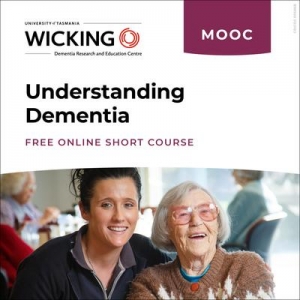 | 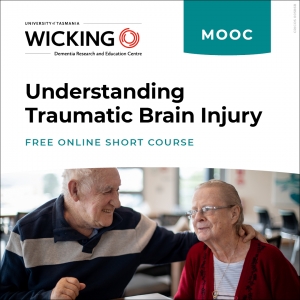 |
Understanding Dementia MOOC 2023 is the 10-year anniversary of the Understanding Dementia MOOC and it has received over 600,000 enrolments from all around the world.
We invite you to join our community and learn about the diseases that cause dementia, how the condition affects the person with dementia, and how we can provide the best quality care. Understanding Dementia is designed to be accessible and appealing to people from diverse backgrounds. Course opens in February 2023. ENROL TODAY | Understanding Traumatic Brain Injury (TBI) MOOC Offers university-quality education about TBI covering the spectrum from mild concussion through to severe injury. Traumatic brain injury is often described as a silent epidemic, with approximately 69 million cases occurring worldwide each year. The course aims to raise awareness and build knowledge to reduce risk, as well as improve management and rehabilitation outcomes for people who have experienced a TBI. Course opens in March 2023. ENROL TODAY |
|
| THINKING ABOUT UNIVERSITY STUDY IN 2023? |  |
|
Stay connected:
|




|
utas.edu.au/wicking
|
| |
|
|